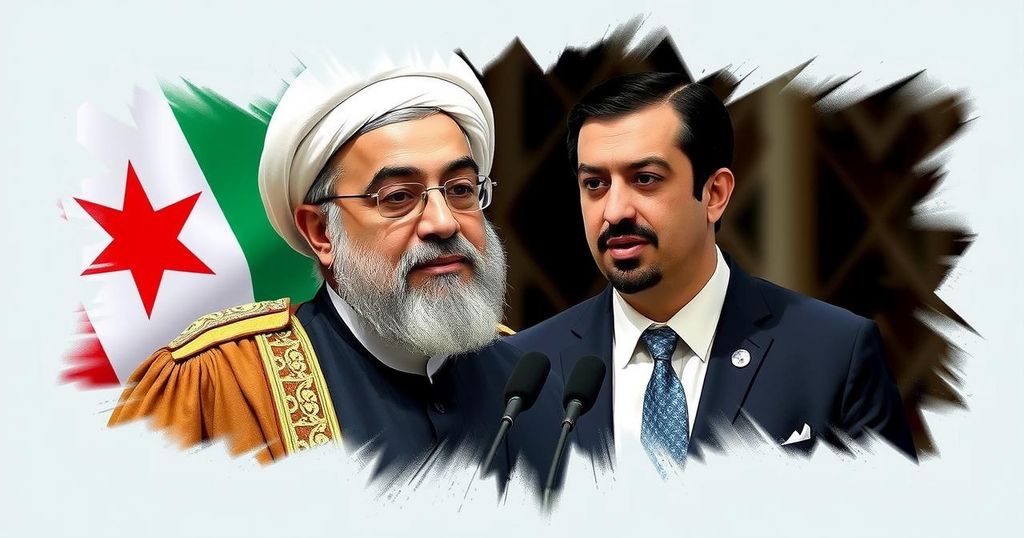Ahmed Al-Shara, the de facto leader of Syria, criticized Iran’s interference in the region during an interview with Al-Arabiya. He emphasized Syria’s need for independence and the rejection of foreign meddling, and pointed out Iranian-backed forces’ withdrawal from Syria as indicative of Tehran’s diminishing influence. Al-Shara’s government aims to stabilize Syria while planning to integrate Kurdish forces and prioritize security and development.
Ahmed Al-Shara, who has emerged as the de facto leader following the downfall of Bashar al-Assad, has vocally criticized the Iranian regime’s persistent interference in Syria. In a recent interview with Al-Arabiya, he underscored that Syrians have liberated their nation and expressed a desire for cooperative relations with other powers, distinctly excluding Tehran if its meddling continues. Al-Shara, previously known for leading Hayat Tahrir al-Sham under the alias Abu Mohammad al-Julani, highlighted the need for Syria to have autonomy from foreign interventions, stating, “We did not enter Tehran or southern Lebanon; we entered our own cities and villages.” He indicated that the Syrian leadership has successfully closed down Iranian-affiliated bases, fulfilling their duty to the nation.
Al-Shara also responded to Iranian Supreme Leader Ali Khamenei’s statements, which denied the involvement of Iranian proxy forces in the Syrian conflict. Khamenei’s declarations, alongside threats to destabilize the newly formed Syrian government, were characterized by Al-Shara as attempts to create conflict and weaken the transitional government in Damascus. Al-Shara further described Iran’s actions as “historical vengeance,” asserting that such conduct is intolerable to the Syrian populace.
The transitional government under Al-Shara faces immense challenges, particularly in stabilizing Syria and managing conflicts with Kurdish factions. Plans have been revealed to incorporate Kurdish groups into Syria’s defense ministry, a step deemed essential for ensuring security and development amidst ongoing tensions. As Iranian-backed forces, including Hezbollah and other militias, have begun to withdraw from Syria, it signals a shift in power dynamics, leaving Tehran isolated.
Al-Shara denounced the detrimental policies of the Iranian regime and affirmed the Syrian people’s aspiration for a peaceful and sovereign future. The current government is now engaged in rebuilding the nation and fostering regional connections, while opposition to Iran’s interventionist tactics grows both domestically and on the international stage.
This article examines the evolving political landscape in Syria following the significant changes in leadership and governance. Ahmed Al-Shara’s rise as a prominent figure highlights a renewed focus on Syrian sovereignty and resistance to foreign involvement, particularly from Iran. The Syrian conflict, which has drawn in numerous foreign entities over the years, has reached a critical juncture, with the new leadership striving to stabilize the nation and rebuild relationships with neighboring states while asserting independence from Iranian influence. Al-Shara’s statements reflect a broader sentiment among the Syrian population regarding their desire for autonomy and peace.
In summary, Ahmed Al-Shara’s criticisms of Iranian involvement in Syria underscore a pivotal moment in the nation’s efforts toward independence and stabilization. His remarks reveal a significant rejection of foreign interference, particularly from Tehran, and highlight the transitional government’s commitment to security and development. As Iranian-backed forces retreat and regional dynamics shift, Syria’s path toward rebuilding and fostering sovereignty appears to be gaining momentum. Al-Shara’s leadership may signal a new chapter for Syria, focused on a peaceful and autonomous future.
Original Source: www.ncr-iran.org






